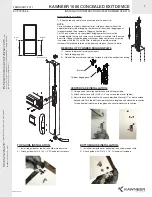
3
En
Espa
ñ
ol
中文
English
■
Adjusting the Bass Range
This speaker system is supplied with acoustic control
material which can be affixed to the bottom of the stand as
a means of adjusting the bass frequency range. Apply the
material as shown, in accordance with your installation
location and personal listening tastes.
Acoustic control material
Press the material to the bottom surface of the
speaker system. Take care not to allow the
material to become pinched between the base
feet and floor.
• When using the speakers in a room with permeable walls,
place the speakers as closely as possible along the walls, or
install them in front of a screen or other object with
reflective properties.
• When used with a television, the speakers should be
installed so that their front surfaces are in the same plane
as the screen of the television.
• When using the speakers with a television screen, the
optimum breadth of sound will be produced when the
television screen is placed midway between the right and
left speakers, and the speakers are oriented at angles of
about 50–60° from the listening position.
• In rooms with hard reflective or resonating walls, it may be
desirable to cover the walls with a curtain, and/or place a
carpet on the floor to dampen excessive sound reflection.
Extending the curtain all the way to the corners will help
prevent local deadening of the sound. On the other hand, if
the wall opposite the speakers (behind the listening
position) is also composed of a hard surface, placing a
thick curtain over the wall will help prevent the production
of standing waves, and result in better sound.
Installation Precautions
• These speaker systems are heavy; installing them in
unstable locations is extremely dangerous and should be
avoided.
Connection to Amplifier
Terminals are provided on the rear panel of the speakers for
connection to an amplifier.
1
Disconnect the power cord to the amplifier.
2
Use the provided accessory speaker wires to connect the
input terminals on the rear panel of the speakers to the
amplifier's speaker output terminals.
Connect the
ª
terminal to the wire with the white line;
connect the
·
terminal to the solid-color wire.
1. Remove insulation at end of wire and twist ends of wire
strands.
2. Loosen the terminal screw and insert the twisted wire into
the hole, then tighten the terminal screw securely.
Connect wire with white
line to amplifier’s
ª
speaker output terminal.
Connect solid-color wire to
amplifier’s
·
speaker output
terminal.
■
The input terminals on this speaker system can also
be connected using a banana plug.
• After connecting the wires to terminals, pull gently on the
wire and confirm that the wire lead is fastened securely to
its terminal. Insecure connections will result in broken
sound and noise.
• Do not allow bare wire ends to protrude excessively from
the terminals. If the bare wires from the two leads touch
each other, excessive load will be placed on the amplifier,
leading to possible damage or malfunction.
• Be sure to connect the + and – leads to their correct
terminals. If the poles at one end of the wires are
connected mistakenly (+ to –, – to +), proper stereo effect
will not be produced.






























